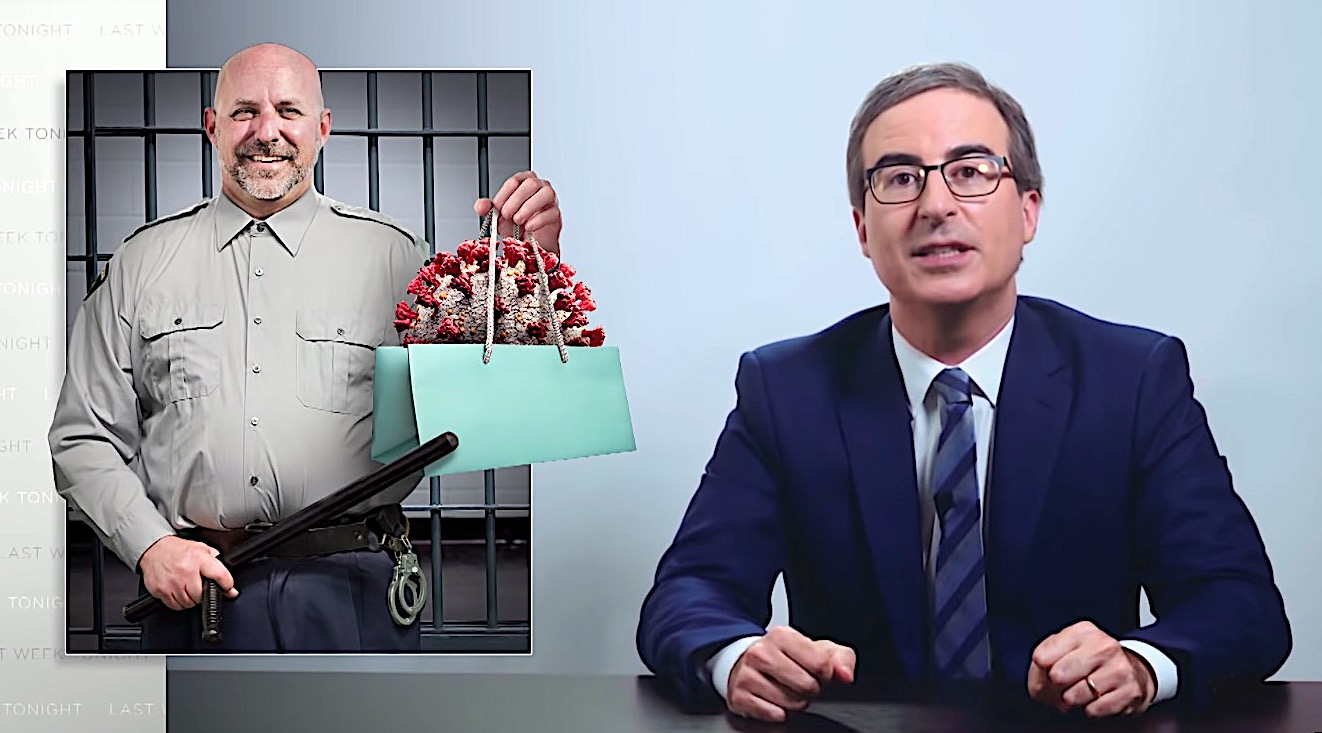John Oliver makes a practical and a moral case why you should care about coronavirus spikes in prisons and jails


A free daily email with the biggest news stories of the day – and the best features from TheWeek.com
You are now subscribed
Your newsletter sign-up was successful
There's been "a series of alarming spikes" in coronavirus cases across the U.S. in recent weeks, "but one particular kind of place has been getting hit especially hard," John Oliver said on Sunday's Last Week Tonight. "The five largest clusters of coronavirus are correctional institutions." Federal, state, and local prisons and jails collectively house 2.2 million inmates, who tend to have higher health risks, he noted. "Inmates feel like it's just a matter of time before they get sick, which is terrible, because we don't punish people by giving them diseases."
"Tonight let's talk about a few things: Why the coronavirus has spread so rapidly behind bars, the impact that has on absolutely everyone, and what we can and should be doing about it," Oliver said. "And I know that if you are fortunate enough to have little to no familiarity with the prison system, it can be easy to ignore this problem. And that attitude is actually reflected by some in local government." But among other things, he said, because about 445,000 people work at prisons — at least 9,100 of them have contracted COVID-19 — and jails are revolving COVID-19 incubators, "coronavirus doesn't stay behind bars, it travels easily."
"The fact is, we should be depopulating prisons and jails as quickly as we can right now — and I know how that sounds," Oliver said. "Because we were all raised hearing that 'you shouldn't do the crime if you can't do the time,' but in our current system, you're never just being sentenced to time: You're being sentenced to a lifetime of social stigma, futile job interviews, and roadblocks to necessities like housing. All of that is immoral enough. There is frankly no reason whatsoever we should now also be sentencing people to die from a virus, because that's not justice, it's neglect." There is NSFW language. Watch below. Peter Weber
The Week
Escape your echo chamber. Get the facts behind the news, plus analysis from multiple perspectives.

Sign up for The Week's Free Newsletters
From our morning news briefing to a weekly Good News Newsletter, get the best of The Week delivered directly to your inbox.
From our morning news briefing to a weekly Good News Newsletter, get the best of The Week delivered directly to your inbox.
A free daily email with the biggest news stories of the day – and the best features from TheWeek.com
Peter has worked as a news and culture writer and editor at The Week since the site's launch in 2008. He covers politics, world affairs, religion and cultural currents. His journalism career began as a copy editor at a financial newswire and has included editorial positions at The New York Times Magazine, Facts on File, and Oregon State University.
-
 6 exquisite homes with vast acreage
6 exquisite homes with vast acreageFeature Featuring an off-the-grid contemporary home in New Mexico and lakefront farmhouse in Massachusetts
-
 Film reviews: ‘Wuthering Heights,’ ‘Good Luck, Have Fun, Don’t Die,’ and ‘Sirat’
Film reviews: ‘Wuthering Heights,’ ‘Good Luck, Have Fun, Don’t Die,’ and ‘Sirat’Feature An inconvenient love torments a would-be couple, a gonzo time traveler seeks to save humanity from AI, and a father’s desperate search goes deeply sideways
-
 Political cartoons for February 16
Political cartoons for February 16Cartoons Monday’s political cartoons include President's Day, a valentine from the Epstein files, and more
-
 ‘One Battle After Another’ wins Critics Choice honors
‘One Battle After Another’ wins Critics Choice honorsSpeed Read Paul Thomas Anderson’s latest film, which stars Leonardo DiCaprio, won best picture at the 31st Critics Choice Awards
-
 A peek inside Europe’s luxury new sleeper bus
A peek inside Europe’s luxury new sleeper busThe Week Recommends Overnight service with stops across Switzerland and the Netherlands promises a comfortable no-fly adventure
-
 Son arrested over killing of Rob and Michele Reiner
Son arrested over killing of Rob and Michele ReinerSpeed Read Nick, the 32-year-old son of Hollywood director Rob Reiner, has been booked for the murder of his parents
-
 Rob Reiner, wife dead in ‘apparent homicide’
Rob Reiner, wife dead in ‘apparent homicide’speed read The Reiners, found in their Los Angeles home, ‘had injuries consistent with being stabbed’
-
 Hungary’s Krasznahorkai wins Nobel for literature
Hungary’s Krasznahorkai wins Nobel for literatureSpeed Read László Krasznahorkai is the author of acclaimed novels like ‘The Melancholy of Resistance’ and ‘Satantango’
-
 Primatologist Jane Goodall dies at 91
Primatologist Jane Goodall dies at 91Speed Read She rose to fame following her groundbreaking field research with chimpanzees
-
 Florida erases rainbow crosswalk at Pulse nightclub
Florida erases rainbow crosswalk at Pulse nightclubSpeed Read The colorful crosswalk was outside the former LGBTQ nightclub where 49 people were killed in a 2016 shooting
-
 Trump says Smithsonian too focused on slavery's ills
Trump says Smithsonian too focused on slavery's illsSpeed Read The president would prefer the museum to highlight 'success,' 'brightness' and 'the future'
